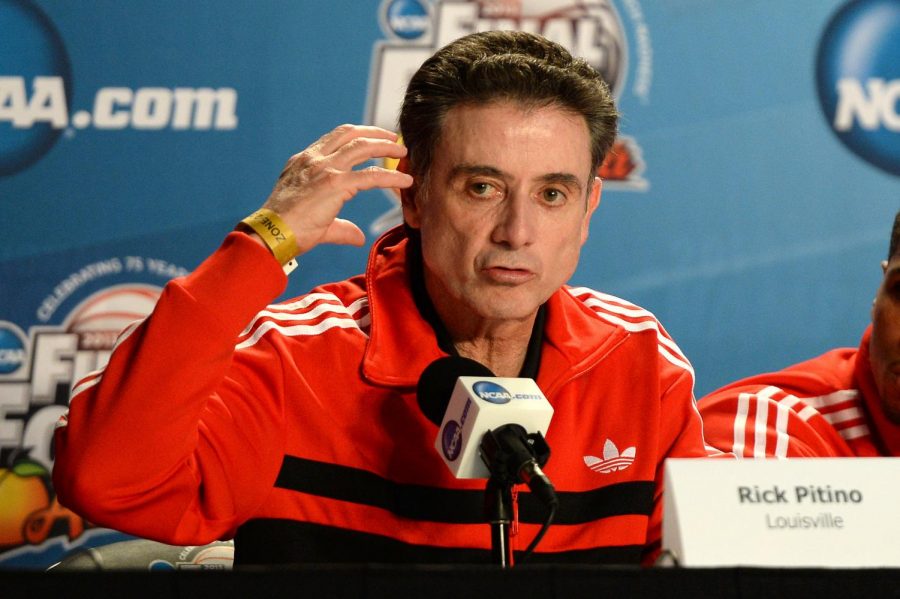Scandal rocks the NCAA yet again
Recent FBI probe has March Madness looking more grim than ever
On Feb. 23, the NCAA was hit with a bombshell. In FBI documents from an ongoing investigation obtained by Yahoo! Sports, it was revealed that more than 20 high-profile Division I basketball programs were allegedly involved in giving financial benefits and preferential treatment to amateur players and their families. These activities are in severe violation of NCAA policy.
Since the investigation began in September 2017, notable programs have suffered repercussions. In October, longtime University of Louisville head coach Rick Pitino was fired by the school after allegations that the program funnelled money from the university’s basketball partner, Adidas, to two recruits.
More recently, ESPN reported that Arizona head coach Sean Miller allegedly colluded with a sports agency to pay a recruit a large sum of money to join the Wildcats’ basketball program. Miller, who has denied the allegations, did not coach for one game and has not been fired.
The NCAA has never paid its athletes to play college sports. The interpretation of this standard has become far stricter today, as players are banned from receiving any outside endorsements, and they are not allowed to have agents. However, there has been a growing discussion as to whether or not NCAA players should be entitled to compensation, seeing as the NCAA earned $1.1 billion in revenue during 2017.
With March Madness and the enormously popular NCAA Division I Men’s Basketball Tournament having begun this week, the controversy surrounding college basketball is at an all-time high. However, members of the WHS community seem to be relatively unfazed by the scandals.
Arguably the most popular activity during March Madness is building a bracket, where people fill out tournament brackets according to how they think the 68 teams in the tournament will fare up until the championship game.
Senior Charlie Billek said that the ongoing scandal and uncertainty surrounding college basketball will not get in the way of his March Madness experience.
“As long as the players are allowed to play and the coaches are still coaching, then I’m gonna make a bracket and watch all of the games,” Billek said.
“I don’t really see a reason not to. Even if there is corruption going on, and there probably is, it’s not going to really stop anyone from watching and making brackets.”
Sophomore Josh Schuttevaer agrees, saying, “I’m still going to fill out brackets because I do it every year and you never know what might happen. The games are still crazy and fun to watch.”
While these students say the uncertainty surrounding these top basketball programs won’t deter them from watching the games, they agree that college players are placed at a disadvantage by not being allowed to receive payment.
Senior Tim Storms believes that the NCAA should compensate players for the revenue they generate off of their play. “[College basketball] makes a ridiculous amount of money from endorsements and TV while the players basically don’t get anything,” Storms said.
“If they’re playing in great D-I schools then it’s a good opportunity for them, but at the same time most players won’t make it as pros, so they should probably be getting something for helping the NCAA make all this money.”
WHS Social Studies Teacher Mr. Ryan Daly thinks that the NBA’s “one-and-done” rule puts aspiring pro players in a bind by making college basketball the optimal route to the pros.
“The easiest way to do things would be to get rid of the ‘one-and-done’ rule that the NBA has,” Daly said.
“If you don’t make it or you go undrafted, then you should be allowed to go back to playing in college. But if they’re going to go to college and give everything they’ve got, then they should be given an annuity, or some kind of insurance policy that is promised to them once they graduate.”
While Daly certainly thinks the NCAA’s system is far from perfect, it will not stop him from watching March Madness. “We watch [the tournament] because it’s entertaining,” Daly said.
“How am I gonna blame everyone for the actions of a few who were obviously not right? I still feel like you have to support the kids, the players, the coaches who did it the right way.”

